| Srl | Item |
| 1 |
ID:
118216
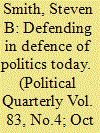

|
|
|
|
|
| Publication |
2012.
|
| Summary/Abstract |
What are the threats to politics fifty years after the publication of Bernard Crick's classic In Defence of Politics? The chief danger lies in the forces of globalisation and the eclipse of the national state as the locus of political life. It is the hope of many in both Europe and the US that we might replace the basic structure of the sovereign state with a variety of postnational forms of organisation such as the UN or the EU. What are the forces behind these developments? Are we entering a world beyond politics increasingly administered by international law courts and tribunals no longer responsible to their national electorates? The possibility cannot be ruled out, but such a world, I suggest, would no longer be a political world.
|
|
|
|
|
|
|
|
|
|
|
|
|
|
|
|
| 2 |
ID:
130947
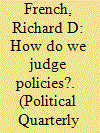

|
|
|
|
|
| Publication |
2014.
|
| Summary/Abstract |
Political science has paid scant attention to the way that citizens judge public policy, assuming that citizens do so, or should do so, in ways familiar to academics themselves, depending upon which of the various schools of thought they endorse. This paper argues that approaching citizens' judgement realistically requires attention to political psychology. Indeed, our conception of citizen judgement can be enriched by attention to research and theory in cognitive psychology and neuroscience. That work emphasises that much judgement occurs spontaneously and very rapidly, that it is involuntary and non-semantic and that it depends upon the emotional impact of experience rather than conscious weighing of situations against explicit standards of assessment such as science, self-interest or moral theory. A moral psychology for public life is sketched out, with implications for judgment by politicians.
|
|
|
|
|
|
|
|
|
|
|
|
|
|
|
|
| 3 |
ID:
096878


|
|
|
| 4 |
ID:
113536
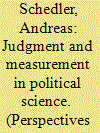

|
|
|
|
|
| Publication |
2012.
|
| Summary/Abstract |
Standard methodological advice in political science warns against the distortion of measurement decisions by judgmental elements. Judgment is subjective, common wisdom asserts, it produces opaque, biased, and unreliable data. This article, by contrast, argues that judgment is a critical intersubjective ingredient of political measurement that needs to be acknowledged and rationalized, rather than exorcised.
|
|
|
|
|
|
|
|
|
|
|
|
|
|
|
|
| 5 |
ID:
140353


|
|
|
|
|
| Summary/Abstract |
Status has long been implicated as a critical value of states and leaders in international politics. However, decades of research on the link between status and conflict have yielded divergent findings, and little evidence of a causal relationship. I attempt to resolve this impasse by shifting the focus from status to relative status concerns in building a theory of status from the ground up, beginning with its behavioral microfoundations. I build on and extend previous work through an experimental study of status threats and the escalation of commitment, operationalized here as a new behavioral escalation task using real financial incentives and framed around a narrative of war and peace. I utilize a unique sample of high-profile political and military leaders from the Senior Executive Fellow (SEF) program at the Harvard Kennedy School, as well as a group of demographically matched control subjects, allowing me to evaluate the moderating effect of power on status concerns while also addressing typical concerns about external validity in IR experiments. I find strong evidence that the fear of losing status impedes decision making and increases the tendency to “throw good money after bad,” but that power aids decision making by buffering high-power subjects against the worst effects of status loss.
|
|
|
|
|
|
|
|
|
|
|
|
|
|
|
|
| 6 |
ID:
096551
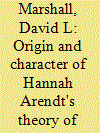

|
|
|
|
|
| Publication |
2010.
|
| Summary/Abstract |
Hannah Arendt's theory of judgment has been the object of considerable interest in the last three decades. Political theorists in particular have hoped to find in her theory of judgment a viable account of how diverse modern societies can sustain a commitment to dialogue in the absence of shared basic principles. A number of scholars, however, have critiqued Arendt's account of judgment in various ways. This article examines criticisms from Richard Bernstein, Ronald Beiner, George Kateb, Jürgen Habermas, and Linda Zerilli. On the basis of early sources from Arendt's manuscripts and Denktagebuch that have not been used in these debates, this article contends that Arendt's position on judgment can be defended against these critics and that her account warrants further exploration.
|
|
|
|
|
|
|
|
|
|
|
|
|
|
|
|
| 7 |
ID:
112366
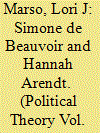

|
|
|
|
|
| Publication |
2012.
|
| Summary/Abstract |
This article compares Hannah Arendt's famous essay on Adolf Eichmann's trial in Israel in 1961 to Simone de Beauvoir's little studied piece, "An Eye for an Eye," on the trial of Robert Brasillach in France in 1945. Arendt and Beauvoir each determine the complicity of individuals acting within a political order that seeks to eliminate certain forms of otherness and difference, but come to differing conclusions about the significance of the crimes. I explain Beauvoir's account of ambiguity, on which she draws in her judgment of Brasillach and elaborates in her 1948 Ethics of Ambiguity, and measure it against Arendt's account of Eichmann's thoughtlessness and its effects on the destruction of conditions of worldly plurality. Linking the failure of ethical judgment on the part of individuals to prior systemic political conditions, Beauvoir helps us recognize struggles over the meaning of bodies and conditions of inequality as central to politics.
|
|
|
|
|
|
|
|
|
|
|
|
|
|
|
|
| 8 |
ID:
109939
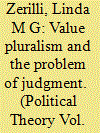

|
|
|
|
|
| Publication |
2012.
|
| Summary/Abstract |
This essay examines the significantly different approaches of John Rawls and Hannah Arendt to the problem of judgment in democratic theory and practice.
|
|
|
|
|
|
|
|
|
|
|
|
|
|
|
|